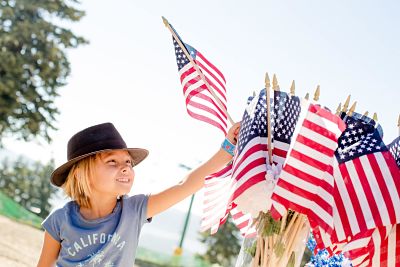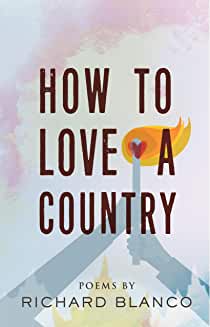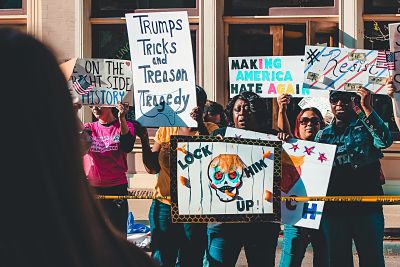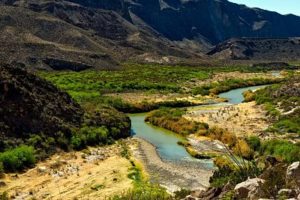
Feb 11, 2020
Review: How to Love a Country, Poems
by Richard Blanco.
Beacon Press, 2019.
I read a fair amount of poetry. I visit Poetry Daily almost daily. https://poems.com/ I don’t linger long over the many poems that remain obscure even after I puzzle over them, that seem to contain secrets known only to the poet. I just print the poems I like and save them in a three-ring notebook.
Though I took one poetry course in college, I remember very little about technical matters, such as the different forms and meters, so it may be presumptuous for me to review a book of poetry. But like music, poetry can speak straight to the heart. In a time when I, like many others, am frightened by the state of our world and our country, grieving at the evil done with our dollars and in our names, this book spoke to me.
 Photo by Rosemary Ketchum from Pexels
Photo by Rosemary Ketchum from Pexels
Richard Blanco was the inaugural poet at Obama’s second inauguration. In his author’s note at the end of the book, he tells us, “…as the first latinx, immigrant, and gay man” in that role, he realized that his story “…is and has always been, a grand part of our country’s historical narrative.” Born in Madrid to Cuban immigrants, who moved to Miami when he was less than two months old, he is torn between the Cuban he imagines, and the American he is. “Destined to live with two first languages, two countries, two selves, and in the space between them all.” From these dualities comes compelling poetry.
 Photo by Joe from Pexels
Photo by Joe from Pexels
He imagines how it was for his mother leaving Cuba, and wonders at her fierce love for her new country – “to love a country as if you’ve lost one.” When they visit DC she tells him, “You know, mijo, it isn’t where you’re born that counts, it’s where you choose to die – that’s your country.” He sang America the Beautiful in church with his mother – “…we sang our thanks to our savior for this country that saved us.” At the family’s first Fourth of July parade he sang for spacious skies “closer to those skies while perched on my father’s sun-beat shoulders.” He loves his country, “I still want to sing despite all the truth of our wars and our gunshots ringing louder than our school bells, our politicians smiling lies at the mic…”
 Photo by Big Bear Vacations from Pexels
Photo by Big Bear Vacations from Pexels
In “What I Know of Country” he traces his love as he grew up. “When all I knew of country was a song and a book“ – the wonderful pictures of pilgrims in buckled boots, founders in wigs with quill pens, “When what I knew of country was only what I read from a map”- the vast land of mountains and rivers and cities he’d never seen,. When even though television brought images of war, “fantasy was still all I could believe of country.” As he grew older and learned the history of exploitation, brutality, injustice, “forgiveness became my country.” “I stayed, you stayed, we stayed for all the boys and girls returning as heroes, some without legs or arms…” for the Challenger disaster, the twin towers, the children in Sandy Hook, the people waiting for rescue in New Orleans after Katrina, “…feeling what we’ve always felt: to know a country takes all we know of love.”
 Photo by hitesh choudhary from Pexels
Photo by hitesh choudhary from Pexels
His childhood in Miami was rich with Cuban culture, but he was always an outsider. From earliest days he was different. When he wanted to play with the girls, his family was ashamed and punished him, other boys picked on him. Almost grown, searching for a life, a place where he belonged, he moved to New Orleans, then Hartford, DC, New York. Finally putting down roots in Maine, he imagines the fterrible losses of exile.
“Dawn breaks my window and dares me to write a poem brave enough to imagine the last day I’ll ever see this amber light…” He imagines losing “the spring giggles of my brook,” “the scent of my peonies or pillows.” He imagines the heartbreak of the day of departure, experiencing everything for the last time. Holding his mother and promising to return though he knows he never will, visiting his father’s grave for the last time, saying goodbye to his husband who cannot go with him. “…a poem ending as I walk backwards away from his love at my door to open another…to harden into a statue of myself.”
After the November 2016 election he staggers through town doing errands, wondering about the chasm that separates him from people he thought he knew, people now wearing MAGA hats, his thoughts flipping through every fearful event on the planet.
 photo with permission from istockphotos.com
photo with permission from istockphotos.com
In “Complaint of El Rio Grande,” he speaks as the ancient river. “I’ve breathed air you’ll never breathe, listened to songbirds before you could speak their names…before you created the gods that created you.” And then came countries, and civilization, and maps: “You named me big river, drew me, thick to divide…you split me in two, half of me us, the rest them. But I wasn’t meant to drown children, hear mother’s cries, never meant to be your geography: a line, a border, a murderer.”
 Photo by Pixabay from Pexels
Photo by Pixabay from Pexels
He writes of the fantasies of the good old days in America, shallow and silly as a 50’s sitcom. He writes of the lynching of a black man in 1981, of a mother writing a poem for the son who died while she was in prison, the rich and poor living in different worlds in the same city.
Each poem is a heartbreak, a plea, filled with love and sorrow, with yearning and anger. After the Pulse massacre, with memories of all the joyful dancers shot down, he writes, “Let’s place each memory like a star, the light of their past reaching us now, and always, reminding us to keep writing until we never need to write a poem like this again.” After the massacre at Marjorie Stoneman Douglas high school: “Seventeen dead carried down hallways they walked, past cases of trophies they won…”
 photo from pixabay at pexels.com
photo from pixabay at pexels.com
In “Declaration of Interdependence,“ a love poem to all of us, he tells us, “We’re the cure for hatred caused by despair.” He lists ‘we the people’: the farmer whose back has given out, the miner who can no longer make a living, the black boy killed by a cop, and the cop who killed the black boy. “We’re the good morning of the bus driver who remembers our name, …every door held open with a smile, …we’re the promise of one people.” He includes the Peace Corps alumni who collect African art, who reminisce about demonstrations and burning their draft cards and who now know “it’s time to do more than read the New York Times, buy fair trade coffee and organic corn.”
Blanco’s stories, his people, his courage in opening his heart, move me. I don’t know that they will move me past despair into action; I am worn out, just doing what I can in one small corner of injustice. But like the music of our great revolutionary movements – labor, civil rights, anti-war, women’s movement – his poetry can inspire and support those who are fighting to free us all from this particular troubled time.
Oct 26, 2018

Book review: Guidebook to Relative Strangers: Journeys into Race, Motherhood, and History by Camille T. Dungy. Norton 2017.
Camille Dungy is a nature poet. She has published four books of poetry, and edited the anthology, Black Nature, Four Centuries of African American Nature Poetry. In her frequent travels she hungrily explores local landscape and history. These twelve meditative essays weave apparently unrelated histories into her thoughts on motherhood, race, and nature, creating connections and a clear pattern by the end.
 weaving: bolga baskets from Ghana source:binoandfino.com
weaving: bolga baskets from Ghana source:binoandfino.com
One essay is a love letter to her infant daughter Callie. Anyone who has had and loved a baby will recognize the nutty intensity of her adoration. Dungy was a well-published poet and a creative writing professor when she had her baby in her late thirties. She was stunned by the power of maternity. “I don’t know if I can define myself anymore, now that I’m your mother. You’ve consumed me.” Hers is an animal love. She wants to gobble Callie up, and has lost all sense of propriety and privacy.
 source:oaklandpost.org
source:oaklandpost.org
She watches as Callie topples over in her crib, almost hitting her head on the bars. “How can I name what I felt when I saw you not hurt? Not this time,” she writes, knowing she won’t be able to protect her child from all harm. “I don’t know if there is a name for this in any language, the hope and hurt and hunger I hold when I hold you.”
She examines the passenger list of the Brooklyn, the ship that carried Mormon settlers from New York to California, in a dangerous voyage around Cape Horn. She reads of the babies born and the babies who died on the voyage, and tries to imagine their mothers. “The story of the Brooklyn makes me breathless with sadness and a relief that almost borders on joy. I haven’t lost you yet. I haven’t lost you yet. Oh my God, oh my God, oh my God.” And so she has been initiated into the desperate love of motherhood, the joy that is always shadowed by fear.
 source: findagrave.com
source: findagrave.com
She is in demand for poetry readings and workshops, and she is an enthusiastic traveler. Because she is nursing, she can’t leave the baby at home with her husband, so she and Callie fly all over the country. She is welcomed into the world of parents, a world she was previously unaware of, and finds that her hosts are eager to help her make arrangements. But strangers in airports are often more eager to hold, to touch, to play with the baby than to help her juggle the huge quantity of stuff that traveling with a baby entails nowadays.
 source: themomedit.com
source: themomedit.com
In places like Maine, where there are few black people, people stare. Though friendly, they are curious, and as always in the United States, her native land, she feels set apart. As the only black person at a writers’ retreat, the other writers expect her to speak for and represent all African Americans. At the same time, one woman says, “I don’t see you as a black woman,” which means, of course, that she doesn’t see her.
The group talks about Michael Cunningham’s The Hours, and the movie made from it. She hasn’t read it. “It’s hard to explain to a table full of white folks that sometimes I’m just not interested in spending time or money on films and books that focus on the melancholy of white experience.” I read books by minority authors, by disabled people, by LGBT writers, and seek out books from Asia, Africa, Latin America. But African-Americans don’t have to seek out exposure to the lives of white people; in schools and media they’re surrounded by it.
 The Hours source:decider.com
The Hours source:decider.com
“When you belong, you can overlook the totality of otherness, the way that being other pervades every aspect of a person’s life.” She writes of the freedom and expansive bliss of her time in Ghana, where she could disappear into the crowd.
 street scene in Accra, Ghana source:wired.com
street scene in Accra, Ghana source:wired.com
Dungy’s connection to landscape, her devoted attention to nature, is what makes home for her. She was raised in California, and says, “Once, I knew the silence and wind-cry of my California hills…When I lived in California, I was at home in the language of sky and mountaintop and sea.” When she moved to Iowa, for a long time she couldn’t write. “When a poem finally came, it was written in a different tongue.”
 California hills source:imgur.com/gallery/2V7y4Bp
California hills source:imgur.com/gallery/2V7y4Bp
 Iowa cornfield source:iowacore.gov
Iowa cornfield source:iowacore.gov
As a black woman she wonders, “How do I write about the land and my place in it without remembering, without these memories: the runaway with the hounds at her heels; the complaint of the poplar at the man-cry of its load; land a thing to work but not to own?” When she is menaced by a dog, she hears its owner say, ‘Sic her. Sic.’ But when the owner repeats the command, she realizes it is ‘Sit girl. Sit.’
 source:greenacreskennel.com
source:greenacreskennel.com
“My poems are informed by displacement and oppression, but they are also informed by peace, by self-possession. When I was a child…the dogs we call bloodhounds…were nothing I knew to remember. When I was a girl-child in that kingdom of open space, and all the land I could see and name and touch was mine to love…When I was a child in the hills behind that street called Bluff View, there was no such thing as history. Sometimes my poems rest again in that quiet space, that comfort.”
 source:ifsnj.org
source:ifsnj.org
Dungy is a poet, and it is a pleasure to read her prose. Her writing flows smoothly, attentive to rhythm and sound. Her thoughts are complex and subtle, though she says, “When writing about race, there can perhaps be precious little wholly fresh revelation. As with writing about motherhood. As with writing about the corruption of the body. As with writing about landscape. It has been the same story for as long as anyone can remember.” Perhaps there is nothing new under the sun, but the light falls on our world from many different angles. Every individual sees a little differently, and this writer gives us the gift of her vision.
Book review:
Dec 11, 2015

Last spring I discovered MOOCs (Massive Online Open Courses), when my friend Sandra posted a notice on Facebook of a Stanford course, Ten Pre-Modern Poems by Women. My sister Luli and I both signed up.
The professor, Eavan Boland, is an Irish poet and professor of humanities and creative writing at Stanford.click She was aided and abetted by young poets in the creative writing program. After Boland talked a bit about the poet and her time, and described the poem, we read it and gave our first impressions. An illustrated lecture went more deeply into the poet’s life and times, and analyzed the poem. A contemporary poet commented on the poem, and then we had homework assignment. Faculty and students responded to each other in the discussion forum.
Some of the poems – Browning’s “How do I love thee?” and Rossetti’s “When I am dead, my dearest” were very familiar. I’d seen them so often that the words had lost their meaning. But doing the homework, and reading the faculty and students’ remarks, I saw them fresh.

“I love thee to the depth and breadth and height my soul can reach” Image: The Grand Canyon. National Park Service

“When I am dead, my dearest, Sing no sad songs for me; Plant thou no roses at my head…” image: Flickriver.com
I’d never heard of Anna Laetitia Barbauld, but I loved her poem, “Washing Day,” a picture of the weekly disruption in an 18th century English middle class family when the washer woman comes to do the laundry. It’s full of vivid scenes and pictures: the clotheslines break, the dog knocks over the drying rack. a little boy loses his shoe in the mud. We see the whole population of the household: the wife, husband, maids, children, grandmother, visitors. There are enough characters and action in Washing Day to make an amusing play, or if you are novelistically inclined there are plenty of scenes to get you started.

Laundry Day c.1765. Image: British Museum
For each week and poem there was a choice of three homework assignments, always including the opportunity to write a poem of your own. For me this was the easy way out. Rhyme and meter are in my blood – doggerel runs in my family. I can write a bad sonnet with the best (or worst) of them, but I soon found I focused more on the poem under discussion if I wrote one of the essays instead.
Rosetti’s poem came alive for me again when I went to YouTube and heard it set to music. I listened to three versions with different melodies and performers. The different songs transformed the poem into something new, and led me to examine the original more closely. click
I was enjoying this course so much that I signed up for another one, Harvard’s Poetry in America: the Civil War and its Aftermath. It had a great deal more material than the Stanford course, all of it tempting. It included a baritone singing Swing Low Sweet Chariot under a slide show of engravings and photos, a discussion of The Gettysburg Address, a Confederate nurse’s diary, and John McCain reciting The Cremation of Sam McGee, which he learned in Vietnam when the prisoner in the next cell tapped it out in code. I soon realized that if I added that course while continuing the Women Poets course I would be a full-time student. I don’t have time for that, so I stopped after a couple of weeks.

Union nurses in the Civil War. Image:civilwarsaga.com
I finished Ten Pre-Modern poems in June, and early in September I started taking Modern and Contemporary American Poetry from the University of Pennsylvania. Each poem was accompanied by a video discussion between the exceptionally good professor and his grad students, conducting close readings of all the poems – word by word and line by line, not neglecting punctuation and line breaks. There was a lot of additional material available, as well as very intelligent discussion on the forums. This was the best and most challenging of the three courses. I stuck with it for eight weeks, through the Beats, but with my Voices Rising concert and a trip to the Grand Canyon looming, and from sheer intellectual exhaustion, I stopped.

UPenn Prof. Al Filreis and grad student Anna Strong.. I loved watching these video discussions partly because Al reminded me so powerfully of my late friend Jim Hardy, down to his voice and the twinkle in his eye.
All the courses have participant discussion forums, and participants come from all over the world. I love hearing furriners talk about us, because it reminds me once again how very parochial we are. People from Peru or Pakistan aren’t necessarily affected by the American orthodoxy-of-the-week. In the Harvard course, several recommended Gone with the Wind as an excellent portrayal of the horrors of the Civil War.

image: ew.com
Most forum posts drew no response – I suppose we’re more interested in our own thoughts than in anyone else’s. In the Civil War poetry course, the longest thread by far was started by someone who asked people to share their creative work. The poetry poured in. None of it had anything to do with the Civil War.
Like any college student, I like to gripe. Judging by the professors in these courses, the current fashion in academia, perhaps stolen from literary fiction, is to discuss everything in the present tense. I hear journalists on NPR do this too.
I suppose somebody has decided that it brings history to life, but it annoys the hell out of me. Aside from impoverishing the language, it flattens our sense of history, and creates a false intimacy, a pretense that barriers of different world-views and culture don’t exist or don’t matter. It leads directly to our presuming to judge the outrages of other eras as though we sensitive souls of the 21st century occupy some moral high ground. I’m convinced that wickedness and cruelty, intolerance and exploitation, selfishness and greed continue in humankind at pretty much the same level through the ages. Only the victims and methods change.

image: thinglink.com

image: linkedin.com
The discussion in the women poets course frequently raised issues of class, race and gender. While I’ve been obsessed with these most of my life, I found myself impatient with what seemed to be requisite and rote comments. I finally wrote a waspish response in my essay about “Washing-Day,” which I generously share with you:
Yes, they hired laundresses, who doubtless had rough lives. Maids worked very hard and had little power or independence. The poet could have written about The Washer Woman, but on this occasion she chose to write about what it was like in the household on wash day. I see no need for 21st century readers to tut-tut about the evils of other historical periods – we have plenty of our own. If I read a contemporary poem about a young girl who is a gifted gymnast, I don’t feel impelled to discuss the sweatshops in which the beads were sewn onto her costume, unless the poet is implicitly leading me there.

Gabby Douglas. Image:usa.com
Aside from my quibbles with substance, I found the technology cumbersome. It took four tries to create a damn password for the Stanford course – with each try, they came up with a new rule: must have numbers, can’t use symbols, must be gluten-free.
 image:passwordmeter.com
image:passwordmeter.com

All my passwords are gluten free. image:fixyourdigestion.com
The Harvard course was worse. It ate my three paragraphs of delicious analysis TWICE. It buried all kinds of critical information several layers down in various links: there were eleven pages of FAQ, and then a separate FAQ thread in the discussion section. It took a lot of digging to discover that the course was designed for Chrome, and Firefox users (me) were particularly likely to have problems.
I recommended the course to Luli, but suggested she just read and view the materials rather than try to respond. She claims she once took a hammer to a recalcitrant computer, and the obstacles in this course were so frustrating that I was afraid she would blow up her whole office.

If I had a hammer… image:hongkiat.com
The Modern Poetry course, which Luli was very engaged with, refused to recognize her after a couple of weeks, and though she and I spent hours on the phone trying to fix the problem, she finally had to give up.
It was their loss. Luli’s participation in the Women Poets course had enriched it for me and many others. Thanks to a wild and crazy adolescence, she barely finished high school and never went to college. She’s as widely read and knowledgeable as anyone I know except our sister-in-law Doris, but she hangs out with a number of highly educated writers and librarians, and she thought it would be cool to have a certificate saying she completed a course at Stanford.

Luli got a certificate. Image:stolinsky.com
We enjoyed the course together by phone and email. Luli in academia is a little like Alice in Wonderland – she sees things for what they are, rather than accepting the strange transformations of truth that blossom in the groves of academe. For example, here was her response to my discussion of the You Tube performances of Rosetti’s poem:
cor blooming blimey! what a load! i listened to the ones you mention, plus a passel of others…not all the way through any of ’em, because i thought them all total rubbish. as maudlin as a bunch of drunks. which the poem isn’t. and so many overblown orchestral arrangements for this simple, tongue in cheek song. my god. but, i liked your essay.

A bunch of drunks. image:crujonessociety.com
For all my carping, I think MOOCs are great. However, be warned. Though all of the courses emphasize that you can participate as much or as little as you want, it’s hard to resist doing more than you have time for. It’s like spreading a buffet in front of a hungry person. The Ten Pre-Modern Poems course is the least demanding (after all, it’s only ten poems) and its approach, including the assignments, the least rigorous. But I enjoyed it, I learned a lot, and it didn’t eat up my life. The Civil War poetry course was rich with material, and I will probably return to it. Though I didn’t stick with it long, my impression is that their poetry analysis is more historical than literary. The Modern Poetry course felt like a graduate seminar in poetry – very intense, and very focused on the poetry. I gained new appreciation for Dickinson, Whitman, William Carlos Williams and Ginsberg, and met others I’d never heard of. I do intend to go back to it, though I’m a little daunted by the time required to do it well, and I may tire of the close reading approach.
Here’s a link to find MOOCs. click. Courses in subjects like engineering, computer science, and business far outnumber the arts and humanities. But their search engine is good, and if you’re so inclined you should be able to find the courses I’ve mentioned, as well as other humanities courses.
In the quest for eternal life and vigor, boomers are advised to keep exercising their brains along with their bodies. Eternal life doesn’t appeal to me, though vigor sounds nice, but I love reading poetry, and learning new stuff is fun.
.
Jun 28, 2014

I
There were five on the boat
In the middle of the night:
Two in the cabin cramped under the deck,
Three with the ice chests under the stars.
Fishing all day
Under flat hot haze,
Drinking beer.
(The boy drank juice,
Sucked oranges.)
They let him cut the head
Off the maco shark Tom caught.
He sawed it with a bait knife
And saw what was inside.
No other boats that day,
Twenty-five miles out.
At Currington’s Ditch
The Gulf gave wonders:
A blowfish, valiant puffer,
Three porpoises,
And always sharks.
‘When you reel in your line
There could be anything.’
The sky began to clear
In the afternoon,
And sunset gave them glory
Yielding to stars.
They grilled the maco on the camp stove,
Finished the Fritos,
And cut into the chocolate cake
That Joe’s wife Sara sent.
Coffee kept them fishing in the dark,
With Coleman light and stars.
No moon until they slept.�
Bill started in the cabin.
They sent him out for farting
And so he joined the two:
Joe on the ice chests,
A jacket for a pillow;
Wayne on a lounge chair,
Hand hanging in fish scales.
Bill took the rear,
Spread a tarp,
And lay watching stars swing above him.
Cradled in the rocking,
He slept.
And woke to water pouring in beside him.
Shouted,
Rose,
And watched Joe stand as
Wayne fell off the lounge chair,
Boat fell from their footing
And water welcomed all.
Bill came up.
Mound of white hull
Tracked by moonlight.
Tom climbing up one side
Joe clinging on a line
Wayne coming out from underneath the bow
And no one else.
The boy was gone.
Bill looked again:
The boat with three men clinging now.
He bellowed my son’s name
And fell under a wave
And rose to cry again.
Joe caught his arm
And hauled him out.
He caught a breath to shout again
When brown arm curving
Past the second wave
Gave answer.
Five on the boat again
Under the stars
Traitor turned over
They clung to her hull.
They talked of how it happened;
No one knew.
Of rescue, and Joe said,
“It’s Sunday one A.M.
They don’t expect us back
Till Monday night.”
So all fell silent for awhile
And watched the solid sea.
‘This was not my mother ocean.
No crest of beauty moving toward the shore
Nor sails near and far.
A bird perhaps
Or sometimes more
Who flew in safety and in power
Above us as we lay.’
They lay face down like sunbathers,
Lined up to broil.
And when the rain brought blessing
Embraced to hold their warmth against the cold.
Watched empty ocean over others’ shoulders.
‘This was another ocean,
Of curve and wave
And endless motion.
The sky itself would not be still,
But glittered stars
Or drifted clouds
And nowhere could our eyes have rest.’
Watched empty ocean teeming still below
(When you reel in your line…)
Thin sounds, thin light,
Dream-fish washed pale,
Seahorse, nightmare,
(When you reel in your line…)
Man o’ war from Portugal,
Tuna, grouper, mackerel,
Lemon, maco, hammerhead
(There could be anything.)
II
Inland, I had no idea of danger.
Free of lover and of son,
Three-day weekend to unwind,
I had no plans, I could do anything.
When Monday night came
And they didn’t
Angry at first (Bill promised he would call)
And then began to wonder.
Empty ocean, one head bobbing,
Pushed the vision under and
At midnight called the Coast Guard.
Dreamed: we’d found them
Woke: we hadn’t
All in a rush
Upon my chest
Seavisions sat
And stayed.
Thought motionless above a sword:
No certainty, no pain.
Waiting brings its own reward:
At eight o’clock, at ten, the phone again.
“No word.
They say a storm is building
North of Tampa Bay.”
“I know. I heard.”
And through the day and into dusk
No word.
Until the call from Joe’s wife Sara.
News so easy, words so plain.
“They found them all
And all are well.
Come to the house.
We’ll drive to fetch them
Back from Cedar Key.”
What story would they tell,
What could they say
To wash my fury and my fear away?
The engine died,
The truck broke down,
We lost our way?
Then at the house,
Joe’s mother in the door,
“I have bad news.
The Coast Guard called us back.
They only rescued four.
We know that they have Tom and Wayne.”
“But of the other three”?
“One of them is missing.
They wouldn’t tell us who.”
In the living room a country family.
Trophies on the mantelpiece,
Coffee on the table.
The television gave us light
Until an aunt turned on a lamp.
In the bedroom Sara lay
And waited by the phone.
Joe’s sister
Sat with her.< br />Two pregnant women waiting.
I stood by a window,
It will be finished soon.
When this cigarette is gone,
When that runner turns the corner
God, he runs so slow!
“The Coast Guard wants you on the phone.”
My son is dead my son is dead.
Someone walked me down the hall.
“Your son is safe, he’s doing well,
We need consent to treat him.”
“But Bill and Joe,
Which one is gone”?
“We cannot tell.
You all must come.”
And so Joe’s Dad and Mom and I
And theirs was dead or mine was dead
Took Sara’s car
(She had to rest and wait in that dark room.)
We took one car
And drove two hours
And I watched cars, clouds, trees, flowers,
And theirs was dead or mine was dead
We didn’t know.
III
We didn’t know how long
The time had been for them.
Three days, almost three nights they lay,
No sleep, no food, no water.
No rest for eyes from emptiness
Though weary minds devised odd sights
And some they told aloud.
My son saw fires on the waves,
Wayne saw a barge,
And on the second night,
Bill saw Death in a cloud
And watched it pelting toward them lit by lightning.
The storm brought waves above their heads
That threw them off the boat.
They struggled back to cling
To the hull and to each other.
Third day brought thoughts of rescue.
They knew the search was on.
By afternoon Joe’s mind was gone.
He seemed to cheer a football game,
Cursed, and shouted Sara’s name.
All vision now inside his eyes
Behind the brown stain rising as life fell.
Bill held him on the boat
Still and heavy in his arms.
Did he die there
Or in the wave that threw them off again?
Bill swimming out to pull him back.
“He’s dead Bill. Let him go.”
And as they spoke, he sank,
Lean scarecrow in the water.
A half an hour later
The helicopter came.�
IV
Thank God for days
That heal salt sores in the flesh
Change funeral to memory
(Joe’s mother in the door
Turned as I neared
And would not speak.
Her son was dead.)
The story encrusted with telling,
The pictures in ambush at night
Come fewer and fade.
Thank God for days.
But something stays.
Under wave the nightmare,
Under surf the stones.
And in a year I go
To the beach north of Daytona,
Pitch my tent behind the dunes,
Sleep and wake to rain,
Stagger between boulders
And on the rock beach
Sit and watch the sea.
The rain ends with the sunrise.
Horizon shows the dawn:
No glory, merely da
y.
Above the line, pearl light.
Mist to the north tells rain.
Twelve pelicans measure the sky.
Below is broken slate,
But if there be measure of dread,
Dark under water confuses my eye.
Dark underwater:
Five lying, one dying,
The trying to save him
The waiting, the waves, yes
This is part of what they saw
Grey ocean, silver sky.
But from no land,
From grave instead.
My son is dead.
‘He is not dead.’
He almost died.
‘He did not die.’
He might have died.
‘He did not die.’
My son will die. Dark ocean, let me be the first to drown.

image:callipygia600.com
Dear readers: I wrote this poem over thirty years ago. It is a true story, though the names are changed.
COMMENTS: I’D LOVE TO HEAR FROM YOU! CLICK “COMMENTS,” BELOW.
NEXT POST: JULY 25
Sep 30, 2011

My favorite place on the Web is Poetry Daily. Every day it gives me a new poem, from one of hundreds of literary journals and books. When I find a poem I like, I put it in a fat, three-ring binder, my own anthology. click
Louis Untermeyer’s A Treasury of Great Poems, English and American, introduced me to poetry in ninth grade. All the scattered bits that remain in my memory come from that year and that book. “Whoso list to hunt, I know where is an hind…” “I like it because it is bitter, and because it is my heart…” “Love at the lips was touch as sweet as I could bear…” I loved that book, but I left all my books (and my first husband) behind when I was twenty-three.

LEFT BEHIND
I found the Treasury again at our library’s semi-annual used book sale. I paid two dollars and was reunited with hundreds of old friends. click
At 94 my father astonished a dinner party by reciting Keats’ Ode on a Grecian Urn, all fifty lines. He glowed with pride, and deserved to. Doris, my sister-in-law, once recited the preamble to Intimations of Immortality. She seemed to do it for the sheer pleasure of hearing the words. My sister followed with Jabberwocky.
I have always wished I had a big collection of poetry in my head. It would entertain me when I have to wait in line, or when I am imprisoned in a small cell for my courageous political actions, or, perhaps more likely, in a hospital bed for one or another ailment of age.
When I retired I decided to memorize poetry. I started with Elinor Wylie, “Down to the Puritan marrow of my bones, there’s something in this richness that I hate.” I struggled to remember the poet’s exact words, as she no doubt struggled to choose them, though some, I hope, came as a gift. Over and over I repeated the whole sonnet, until it seemed to be firmly planted. An hour later it was gone.
In my computer I have a file of the ten poems I managed to memorize. I wish I had such a file in my brain. Each poem I added drove out the previous one.
download my ten poems
Years ago, I paid my two foster children to memorize short poems. I believe I paid them a quarter. The first poem was
I never saw a purple cow
I never hope to see one
But I can tell you anyhow
I’d rather see than be one.

PHOTOBUCKET.COM BY RESPHINA
Like many other plans from our early days together, when I thought I could achieve perfection, this one soon fell by the wayside and our path descended into the mucky quotidian.
I would like to try the same thing with Amanda. She already knows the pleasure of rhyme and rhythm. But Joe believes it is wrong to pay for learning, which should be its own reward. He is adamant, so I concede, though I still believe it’s a good idea.
I read poetry for months at a time, and then I let it go. Every time I come back to it I am renewed. Thank you, Poetry Daily, for the daily gift.


 Photo by Rosemary Ketchum from Pexels
Photo by Rosemary Ketchum from Pexels Photo by Joe from Pexels
Photo by Joe from Pexels Photo by Big Bear Vacations from Pexels
Photo by Big Bear Vacations from Pexels Photo by hitesh choudhary from Pexels
Photo by hitesh choudhary from Pexels photo with permission from istockphotos.com
photo with permission from istockphotos.com Photo by Pixabay from Pexels
Photo by Pixabay from Pexels photo from pixabay at pexels.com
photo from pixabay at pexels.com
